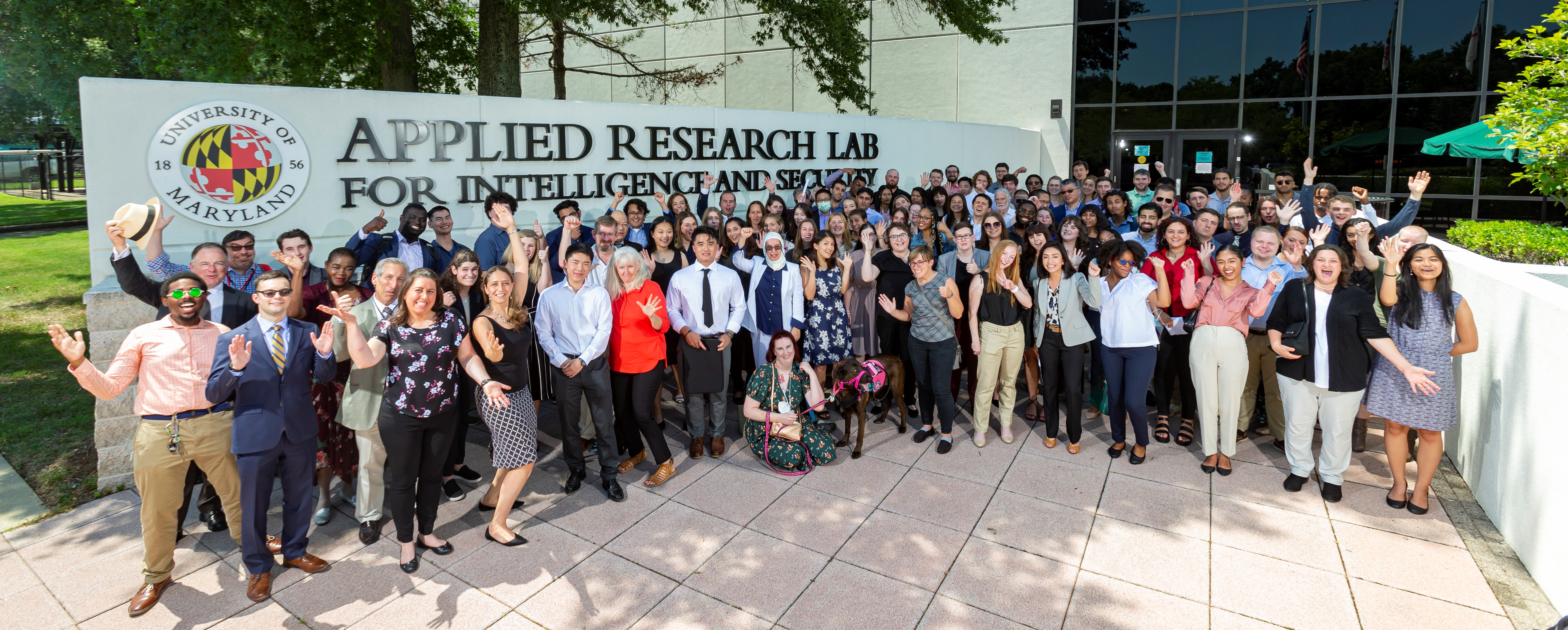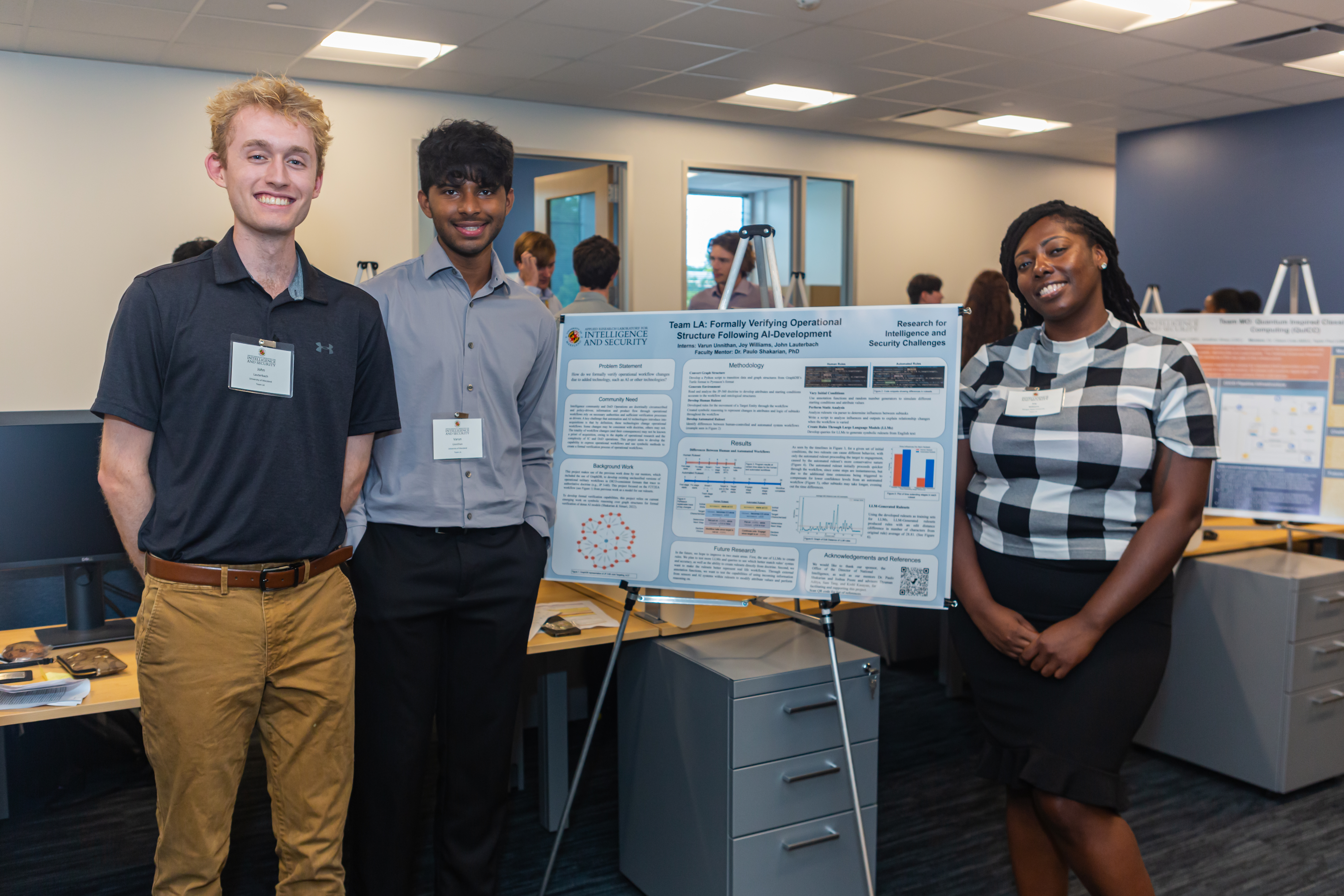
The RISC 2024 application portal is now closed!
(FAQs)
~~
Learn how to become a RISC faculty mentor this summer
Learn about past years' programs
Attend a RISC information session.
Next session: COMPLETE; contact for a recording and review FAQ
Research for Intelligence & Security Challenges
Summer Internship for Hard Security Problems
May 28 – August 2, 2024 NEW DATES! June 3 -- August 9, 2024
The Applied Research Laboratory for Intelligence and Security (ARLIS) at the University of Maryland, College Park, is seeking outstanding undergraduate and graduate students to participate in the Research for Intelligence & Security Challenges (RISC) Initiative internship program. This 10-week paid and mostly virtual program pairs students with faculty mentors from INSURE consortium member institutions and the Department of Defense (DOD) and Intelligence Community (IC) and offers the opportunity to be sponsored for a security clearance and to be considered for future employment with the U.S. government.
Competitively-selected RISC interns (RISCers) work in teams with mentorship from university faculty and government practitioners, tackling real security and intelligence problems hands-on. Project topics will be posed by government operators, and supported with realistic data sets and other materials. Over the 10-week period, students will conduct research and participate in lectures and regular team development meetings in a shared virtual work environment. The summer program concludes with several days of in-person activities in College Park, MD to discuss project outcomes with peers and visiting experts from DOD/IC and to gain greater context on how the work fits into government sponsors' mission space.
The program is structured to facilitate interactions within teams, between teams, and with government sponsor representatives. Interns attend weekly seminars and regular team development meetings in a shared virtual work environment (though select projects may require on-site work). Interns then participate in final week briefings and activities in person (with travel support).
Given mutual interest between the sponsor and interns and available funding, RISC projects often continue into the academic year, sustaining connectivity between interns and sponsors through ARLIS.

Eligibility
We seek outstanding graduate and undergraduate students with expertise in the disciplines listed below. All U.S. citizens enrolled in an accredited university program as of Fall 2023 -- particularly rising juniors and seniors and early graduate students -- are eligible and encouraged to apply. The RISC Initiative works to support a robust and diverse future workforce and welcomes applications from Historically Black Colleges and Universities and other Minority Serving Institutions (HBCU/MSI) and other candidates from underrepresented populations.
Internships are a 40-hour-a-week commitment and second employment and summer courses are strongly discouraged. Candidates with questions should engage the RISC program office.

While specific topics are in development, the missions supported are likely to include disinformation, insider risk, and critical technology protection. The RISC Initiative is particularly seeking interns with expertise in one or more of the following disciplines:
- Computer Science, Information Science & Engineering: AI/ML algorithmic development, HCI, software engineering, systems engineering, media analysis and forensics, information systems design, geographic information systems, AI Assurance, Human Systems Integration;
- Mathematics and Statistics: Data analytics, quantitative modeling, experimental design, graph analytics;
- Social & Behavioral Sciences: cognitive/neuroscience & psychology, sociology, criminal justice, teamwork and group dynamics, communications, disinformation and misinformation, social network analysis, anthropology, human geography (e.g., pattern of life/mobility modeling), political science, international relations;
- Languages and Linguistics: languages of interest to global security including but not limited to Mandarin, Russian, Farsi, Korean, and Arabic; computational linguistics and natural language processing; natural language understanding;
- Data Science: Data and knowledge engineering, data curation, tagging, metadata, repositories, data visualization, library sciences;
- Additional topics may include Measurement and evaluation of learning outcomes, environmental modeling and remote sensing, human factors, and regulatory public policy.

>>> How to Apply <<<
The 2024 RISC application is closed.
Selection criteria emphasize demonstrated strengths in relevant fields, experience working both independently and in teams, and demonstrated interest in contributing to national security.
After creating your RISClink account, you will need:
- A letter of interest describing:
- Your disciplinary focus (referencing the topic areas above);
- Experiences that have prepared you for success in an internship focused on intelligence and security challenges;
- Experience with machine learning, programming, and/or statistics (not required for all roles); and
- Anything else in your background that could be helpful for the selection committee to know.
- Your résumé,
- Copy of your transcript(s)*, and
(after submitting #1-3) - One recommendation letter** from a professor or former supervisor.
Your application will not be considered complete until a LOR has been submitted!
*: Unofficial transcripts (i.e., downloaded from the university web portal) are acceptable. Graduate students should submit undergraduate transcripts as well, particularly if in their first year of study.
** Upon submitting your application, the portal will show a new window where you can input the name and email address of your Letter of Recommendation writer, who will then receive a link to upload a document. You will not be able to access the letter, but you'll be able to see when the letter has been submitted.
Remuneration
Interns will be paid on an hourly basis equivalent to between $9,000 and $12,000 over the ten weeks, commensurate with education and experience. Given the virtual platform, housing accommodations, transportation, and food allowances are not provided. However, for those local to the DC area, part-time physical campus workspace can be provided. For in-person final week activities, all travel expenses will be covered as required.
Information Sessions
We will host a series of RISC information sessions for interested students - we will give an overview of the program and share some of the previous projects. Additionally, you will have the opportunity to hear from past RISCers and ask any questions you may have about the program.
First Info-Session: Friday, November 17 from 4:00-5:00 PM ESTSecond Info-Session: Thursday, December 14 from 2:00-3:00 PM EST- Final Info Session: Friday, January 19 from 1:00-2:00 PM EST
Zoom link here. Add 12/14 session to Google or Outlook (.ics) calendars.
Email risc@arlis for links to past info session recordings. Some of the FAQs from past info sessions are now shared here.
